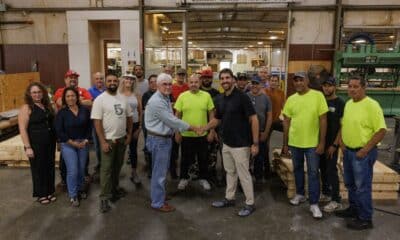City Government
Prime Lunchtime with the City Manager: Micro-mobility Hubs, License Plate Recognition Cameras [Podcast]
Published
5 years agoon
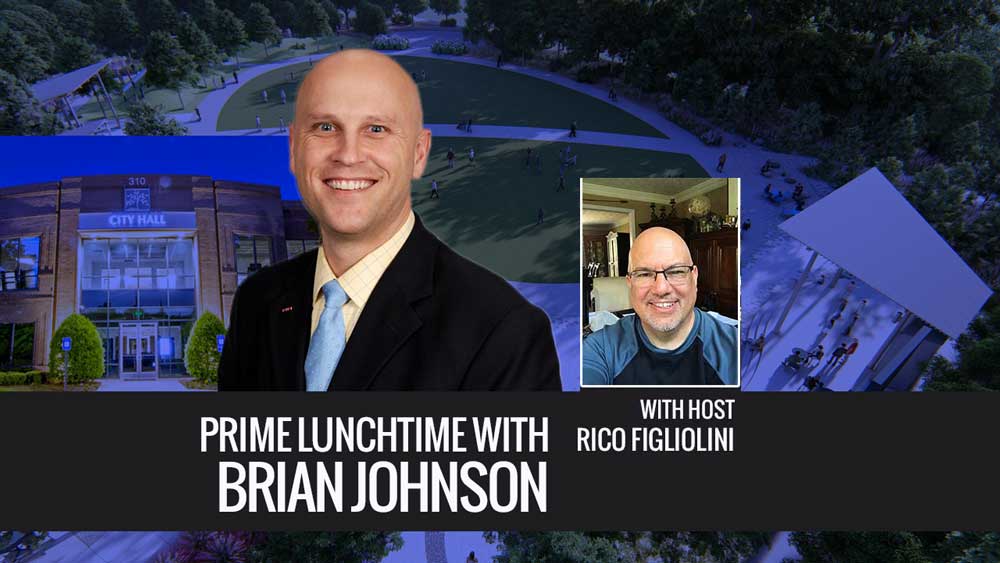
City Manager Brian Johnson joins Rico Figliolini to discuss a possible Micro mobility Transit Hub, e-scooters, LG – MRI, Special Service Districts and updates on the pedestrian bridge, the Indigo Hotel, license plate recognition cameras and more. Recorded at Atlanta Tech Park in the City of Peachtree Corners, Georgia
“A lot of what that is driving that lately tends to be around Curiosity Lab as we know it’s serving the very purpose that it was created to serve, which is to become a magnet for companies… But a lot of what we’re doing in the economic development arena is taking the Curiosity Labs environment that we’ve created and talked to companies about how they can use it”
Brian Johnson
Related Links:
https://www.curiositylabptc.com/
https://www.hargrayfiber.com/
Timestamp:
[00:00:30] – Intro
[00:02:42] – LG Tele-scooters
[00:16:39] – LG MRI
[00:23:19] – License Plate Recognition Cameras
[00:40:22] – Redevelopment Authority
[00:44:03] – Pedestrian Bridge
[00:46:22] – Indigo Hotel
[00:47:17] – Fiserv Property
[00:47:31] – Peachtree Corners Festival
[00:48:44] – Workforce Housing
[00:51:40] – Closing
Rico: [00:00:30] Hi everyone. This is Rico Figliolini, host of Peachtree Corners Life and this show once a month with Brian Johnson, the City Manager. It’s Prime Lunchtime with the City Manager. Hey, Brian.
Brian: [00:00:39] How are you?
Rico: [00:00:40] Good. Good. It’s been awhile. We’re going to go through, let me, let me talk about my friends though. Our lead sponsor. So my friends had Hargray Fiber. They just became a lead sponsor, and I want to tell you a little bit about them. They are a company that is not unique in the space, but provides unique solutions. So they are a fiber company business to business. Just moved into Peachtree Corners that based out of Savannah and Hilton. They craft customized solutions for hundreds of businesses throughout the Southeast. They are working with small businesses to provide affordable bundled services and enterprise level businesses that are looking for a full suite of managed IT services. So Hargray Fiber can customize those solutions to work best depending on what your company and your industry needs. So an amount of that industry, Internet, high quality TV, phone solutions. They’re the ones to do it. They have a local presence. You don’t have to worry about the cable guy. They will be there and they are community friendly and they are doing lots of outreach to the city of Peachtree Corners.
Brian: [00:01:46] I’ll just say, let me add one more thing. Hargray not only has their office in Tech Park. But they are the fiber provider, the official fiber provider of Curiosity Lab. So if you think of all the technology that we have, or we’ll be talking about and Curiosity Lab, be it 5G. Which, you know, people are like, wait a second, 5G is wireless. Well, the wireless, the 5G antennas that spit the wireless signal out have to be powered by something and they’re powered by a fiber line and it’s Hargray, the backbone of Curiosity Lab. All the technology, the backbone of it is the fiber line that Hargray provided. So it would, it literally, none of it could work without a fiber optic cable that Hargray provided is, wouldn’t be working. So they’re a key part of Curiosity Lab.
Rico: [00:02:42] Excellent. And if you want to find out more about Hargray, just go to HargrayFiber.com. That’s HargrayFiber.com. And we’re on, we’re in Atlanta Tech Park and this podcast studio is here at, which is in Tech Park, Atlanta on the road of Curiosity Lab that went on the test track. So this is cool. In the midst of this, we’re going to be talking about a lot of things going on, high tech and and also keep an eye out for Peachtree Corners Magazine. Our next, this should be out in another week or so. And we have a cover story on companies here on Peachtree Corners, innovative technology driven, and a big part of this community. So, we’ve been, I think, it’s been about a month maybe that we have, haven’t spoken since. I mean, you’re on the show on the podcast. So there’s lots going on. And guess what, we were talking ahead of the show about something going on there. Reminds me of Bladerunner, for some reason. It’s just the technology to be able to see the big images of things on, in the public realm and public streets and stuff. Tell us what’s going on with the Tele-scooters with LG specifically that you met with, that’s going to be out there that people can see.
Brian: [00:03:58] Well, you know, part of any city’s operation is economic development. You’re always wanting to make sure that, you know, the businesses you have are healthy or attract new business. And so you, you know, cities do that. We do that. A lot of what that is driving that lately tends to be around Curiosity Lab as we know it’s serving the very purpose that it was created to serve, which is to become a magnet for companies to either come to Peachtree Corners on a temporary basis, you know, even for the day to use or, or tour or whatever. And you know, we at least know that if they’re here for one day, they got to eat lunch and they’re going to eat in our restaurants. And you know, just a couple of days in our, our, hotels, we’ll get, you know, the indirect benefit of revenue from them. But a lot of what we’re doing in the economic development arena is taking the Curiosity Labs environment that we’ve created and talking to companies about how they can use it. And we’re getting ready to unveil the next very unique user of Curiosity Lab, which is the tele-operated E-Scooter. And so…
Rico: [00:05:14] Which is available now, actually even, right?
Brian: [00:05:16] No, not quite. Not quite. You may have seen them out there, the company getting ready to, to task, but the way it’ll work is we all know what an E-scooter is. A lot of controversy lately about E-scooters in cities. Especially in Atlanta, where you’ve had two things that have created problems. One, of course, is the users of the scooters, not obeying traffic laws or being cavalier. Too fast on sidewalks when they shouldn’t have been on sidewalks at all. Or I’m trying to zip in between automobiles and they get hit by, you know, so the, unfortunately, unlike the drivers of automobiles, irresponsible drivers, you can’t. You can never overcome. But the other aspect of E-scooters that are frustrating is the fact that people will leave them wherever they want. And the difficulty and the overhead costs of the company that owns a scooter, repositioning them for more people makes it difficult. And it frustrates people when you’re walking down the sidewalk and there’s, you know, 12 E-scooters all over the. Well, the company and it’s two companies that joined forces for this that are going to be testing a way to maybe address that issue is. We’re going to have tele operated E-scooters. And those are E-scooters, like you could buy from, you know, whatever, you know, sporting goods store or whatever. And they have been retrofitted with a kit that adds two little training wheels to the back so that they can stand on their own. Because most of them are just, you know, two wheels so they can stand on their own and a camera on the front stem and when necessary, the E-scooter can be driven by a human from a remote location via the camera that the, that they’re viewing through the, so in this case, the company has a tele operation center in Mexico city, and so they’re going to have, it’s almost like a call center. Where you got people sitting at stations and when it’s time for the E-scooter to be activated, you know, from a distance, they can then have the screen go live. The consumer takeover and drive the East scooter and how that’s gonna work is they’re going to look at the scalability of doing this for two reasons. One, you can summon the scooter, like an Uber or Lyft. And so they’re going to have an app that if you want to do it for, if you work in Tech Park or you want to do it just for novelty sake, you can have the scooter come to you. And then you jump on it and you drive it like any other scooter. That’s one. And the other one is, is they’re going to, the companies go into look into whether or not on a
large scale by large scale, they’ll get up to about a hundred E-scooters, but no more than that. They’ll see if they can reposition the E-scooters from that Mexico city location using tele operation and not have to get up truck and two guys driving all these locations.
Rico: [00:08:52] Which is a big economy in Atlanta cause that’s what they’re doing in Atlanta.
Brian: [00:08:55] That’s correct. That’s what they have to do everywhere because what other way would they reposition them?
Rico: [00:09:00] So 5G actually helps it because there’s no latency, really, or very minimal?
Brian: [00:09:06] I think so. Yeah. For all intents and purposes, none for that. So that’ll help. And then they’re also testing, because you know, 5G will take a while for it to get their testing. The ability to transition from 4G LTE to 5G and back and forth. And then, so they get to test that out. And then what you refer to at the beginning is this got back from talking with a local company called LG MRI, which makes LG exterior televisions screens, whether in, it could be touch-screens or, or what, but they make it specifically for the outdoors. And we are talking about maybe partnering or, or having a collaborative effort between a number of companies. In the case of LG MRI, they would provide touch-screen televisions at the bus stop and we would also integrate this kind of micro mobility transit hub. It would be a bus stop, a real world bus stop that Gwinnett Transit…
Rico: [00:10:12] That already exists.
Brian: [00:10:13] Gwinnett County transit has, exists. Who would have the, you know, the bus stop shelter cover would have solar panels and those solar panels would provide the electricity for the LG screens and we’re going to integrate a docking station for the E-scooters into this. And so you could invariably ride the bus to this spot and then jump on the E-scooter to do that last couple hundred yards or whatever to your office, or vice versa. When it’s time to go home, if you’re going to go home via bus, and this is like real world buses isn’t like a, you know, coming to people testing, this is a, yeah, but, and these scooters are going to be available to the public.
Rico: [00:11:05] Anyone that’s within technology park?
Brian: [00:11:07] Well, no, you can come over here and just use it for novelty if you want, but I’m just saying, you know, you can actually get on and so, but let’s say you work in Tech Park. I mean, you could some in the E-scooter to your office through an app, through an app. It gets there. You jump on it, you ride it to the bus stop. You put it in the docking station and then when the bus comes, you get on the bus while you’re waiting, you can either see at, you can use the interactive kiosk, you could find out how far away the bus is, you can do all sorts of things.
Rico: [00:11:40] That might be cool to be able to see real live, 10 minutes away. And then also it’s going to be able to play probably commercials or all the things in big huge screens and stuff. That’s the part that reminded me about Bladerunner for some reason.
Brian: [00:11:56] And you know, this kind of stuff, these companies want to, you know, be involved in creating, you know, call it the bus stop in the future. We have all these things together, you know, inside these screens and these television, exterior television screens, the LG MRI, people call it their chassis, but it’s got a container basically. That houses all the components inside and it’s completely watertight and it also cools the interior components.
Rico: [00:12:30] So even if it’s a hundred degrees outside.
Brian: [00:12:31] Even if it’s a hundred degrees, it’s good, but it also has the capability of adding third party devices inside the box. To provide lots of things outside of this one box, including like DSRC roadside units, 5G small cell antennas, wireless access points. All inside of this box and the television that it will, the entire, you know, kind of all in one module also has edge computing. So it actually can compute certain things. It has a degree of artificial intelligence and computation ability at that location versus having to go, you know, somewhere to some brain somewhere else and come back. And so it could, so these companies are loving this sandbox we’ve created. For them to come play. And so we’re kind of like being a, to a degree, a, a matchmaker, you know, we’re, we’re talking to, Hey, they’re doing this and what about you doing this? And we’re kind of like the matchmaker that owns the house and we’re like, you know, or owns a restaurant. We’re like, why don’t you two get together and you can come to our restaurant and have your date where we’re telling them we got some property here. No, he’s saying to come here, we’ll kind of facilitate. We’ll let you tie into certain things.
Rico: [00:13:51] And you know, it’s a cool, it’s almost like I could almost see at some point, you know, asking Gianna, or Emma, what’s the temperature now and how far is that bus? It’ll answer that.
Brian: [00:14:00] Yes, yes, they have that. So, you know, here’s some interesting stuff. So these units, when we were talking to them, they have deployed these units recently at the entry points. To Taylor Swift concerts. And what they’ve done is the screens have been displaying imagery that’s of some interest to people going there. And inside the box is facial recognition software. And when people are looking at the image, it will take and get us a snapshot of their face. And it scrubs that against databases that I guess the Taylor Swift security team has for people who are on, kind of call it a watch list for her like that. Then there’s a restraining order against them because they’ve been stalking her. They’ve made comments on social media sites about her. They’ve been, and so these celebrities have people that do that, and so they’ve been able to identify people who have posed or have a high potential, suppose a threat to her. So that helps them. Sure. It’s being done on a private, private venues. So there’s not this whole, you don’t have any, you know, they voluntarily went to this for.
Rico: [00:15:30] Sure. It’s not a public thing.
Brian: [00:15:31] No, it is not a public, they buy a ticket. And they know. Right. And so I’m at a private, you know, concert venue. But then the security team knows, and I actually don’t know what was done about it. It could have been, they just kept an eye on him. It could’ve been that they were asked to leave because of, you know, I know that the team, you know, the, the, the company that provided this housing, this chassis for all this technology did say that, you know. They, it identified some people who there was a restraining order against, because they had been convicted of stalking. So maybe there’s those rests leave. But anyway, the other interesting thing is the concert venue insurance requirement.
Rico: [00:16:15] Did that go down?
Brian: [00:16:16] Went down because the insurance company was like, you know what? You are minimizing risks for things, so you don’t have to have as many. But the unique part of this is this, is technology that’s housed in one water tight, secure unit, and it’s using multiple things at the same time to further.
Rico: I mean, just interested in the, you know, at home, if you have an alarm system, of course your home insurance will be discounted. So similar. And it also introduces, I mean, this is great. I mean, I’m, I’m all for this, certain people are like afraid of the technology to a degree. And there is even talk, I don’t know if this is, I think this is in England, Europe at this point. But you may come across the ocean to us to talk about moratorium and facial recognition, recognition videos because of in the public realm, in the public space. Because of privacy concerns and stuff. And I know, you know, so our next and next thing, and this is cool, so that was the LG MRI?
Brian: [00:17:20] Yup.
Rico: [00:17:20] So people can Google that and find out more.
Brian: [00:17:23] Yeah. I mean their, their manufacturing plant. Fascinating. They had just asked us to come over and meet and they wanted us to show the, show us their site too, but they are going to have, they also are interested in hanging digital, digital screens on the side of light poles like you see out here now that are the banners, they make, ones that you can have digital. So you can have all sorts of messaging on that and it’s not the same thing. So yes, it is. So they’re going to do that stuff. So today was, they were like, we’re going to do something where can we put things as we told them, here are the areas of our sandbox. You can do things. And so we’re going to have another meeting in a week or two where they’re going to come back and say, we would like to do things here, here.
Rico: [00:18:15] That’s amazing, I bet you didn’t even think about that. This and that at this point.
Brian: [00:18:18] There’s so much of this that I didn’t even know. I mean, some of it’s really cool, like, wow, you know, I didn’t realize that technology is here. Some of it is in technology that I thought was farther along than it is. It’s represented that it is, but when you get into it, it’s not quite as, so I’ve had both, but yes, I mean, so just unique things that can be done in a, in a, you know, using technology, especially when you pair a bunch of them together.
Rico: [00:18:47] The, so let’s, let’s go into, because. This past Tuesday, city council meeting, a few things went on that LG MRI that was really all support allowed because of what you passed just recently. The micro mobility, a piece of it.
Brian: [00:19:02] Yes. So for us to have E-scooters operated on, because currently E-scooters, haven’t really been addressed by the city much. It was addressed in our entertainment district ordinance in it for it prohibited E-scooters, essentially in our entertainment district, which is our town center and kind of that area. Other than that it’s not addressed. So theoretically, you know, somebody could go buy one and go out there, but we had to address it in some way. But because this is a pilot program, it’s testing or whatever. What we did is we created the programs similar to kind of how we regulate other activity within our right of way. Like if a telecommunications company wanted to come in and do work in our rideaway, like very cable, we have to give them a permit to do that. We did the same with the E-scooter, created one for a scooter so that they can have, that can be the activity that they are involved in in our right of way.
Rico: [00:20:09] Is that a sunset rule also?
Brian: [00:20:11] It is. So it set a couple of things. One is initially it’s just a curiosity lab. Two, it is a year long pilot program. Three, it has to be geo-fenced. So there has to be, the technological capability of having the E-scooter shutdown if it gets outside of a previously defined area. So if you tried to drive it up to the town center, at a certain point it was shut down. Similar for the golfers out there, sometimes you get on a golf cart has GPS and you’re supposed to be cart path only and you get off the car path, often times it’ll shut down or it’ll go real, real slow until you go back. And so similar. And then we also require this permit. Requires the E-scooter operator to have tele operation capability. And because E-scooters in general don’t need to be tested, I mean they work, right? This is the test part. The reason there’s a lab that’s needed is because of that tele operation. So we’ll start on that and if it works out, we can always expand the boundaries a little bit. Would love to create a scenario in which you could have E-scooters go from the thousand plus hotel rooms we have at the south end of Curiosity Lab between the Hilton, the Marriott was a Homewood suites in Hampton and the town center for that. I mean that’s, there’s a, that’s a need base between the two, especially Sunday or Thursday night,
Rico: [00:21:48] 141 because those sidewalks.
Brian: [00:21:50] Potentially, I mean, state law, there are some, there’s a lot of in the, in the Georgia General Assembly. Is currently considering legislation on defining certain aspects of
E-scooters. So we’re keeping an eye on that and made reference to our permit, would permit it would have to adhere to all state and local laws on E- scooter. So if that tweaks things, you know here soon because the General Assembly did something. But anyway, that’s kind of how it will operate. But they’ll get ultimately up to a hundred scooters and they are available to the public as just like any other e-scooter. Well, I don’t know if it’s free. They may end up having a slight, okay. They might, we’ve encouraged it not to since it’s a pilot, but that’s not our decision. So we don’t know that yet. But yeah, but. If you do get on it, you know it. It’s, it’s an off the shelf E-scooter that they’ve nearly outfitted with a camera on the front stem, training wheels on the back, which as an operator of it, you don’t deploy, they deploy it remotely. So it’s just like any other ones. If somebody’s been on a bird or a lime or do the same thing, it’s just that when you’re off of it, the company may on its own decide to move it somewhere else.
Rico: [00:23:19] So we were talking a little bit about the micro movability part and stuff like that too. So there’s gonna, you also discussed the, license recognition, facial recognition. cameras that are going to be deployed. So did that come to fruition did the city council decide on a plan on how that’s going to happen?
Brian: [00:23:39] So at the council meeting, we had the first read of the final bill. Final vote will be at the February council meeting, but the council had the first read of an ordinance creating the, or it’s really activating the city’s ability to create what are called special service districts. What that is, is, home rule municipalities in Georgia have the authority to create a special service district and they can define the district how they essentially see fit. And inside this district, there can be unique things that happen inside this, just this district for a specific service. An example of that would be you could create a special service district for public safety, and you could do things inside of this special district that were specifically aimed at improving public safety. So doing things like installing video and license plate recognition cameras, installing streetlights, those are things that improve public safety. That special district can have unique things about it. For instance, it could, council could say, install a bunch of streetlights on a street that was dark, that was not a connector street, one that did not serve a true public purpose. So a neighborhood street that maybe was a residential street that had houses on it, and a dead end. But the mayor, if it had problems there, the city could install streetlights on the street and then take the pro rata share of the cost of the streetlight and equally distribute it amongst all the homes that benefit from the surface or all the apartments, as the case may be the apartment units.
Rico: [00:25:47] So now volunteering to be part of that if someone wants to, if a subdivision wants to be part of that and volunteer, you guys have set up percentages or ways to do that?
Brian: [00:25:58] Yes. So, and you know, you’re referring to the fact we’ve talked about before, that this ability to create a special service district gives counsel the ability to determine what threshold that would be required before they did it. We can start with kind of the fact that council can impose it.
Rico: [00:26:19] Wow. Okay.
Brian: [00:26:20] If it against, in other words, that it doesn’t have to be a threshold. They have that authority. I’m not saying they will, but they can’t. And then I will give you examples of that where they may one day. Yes. An apartment complex that has a crime problem. That has been, you know, there’s been some issues or whatever. They can decide, you know what, you don’t have enough street lighting, so we’re going to put street lights in there.
Rico: [00:26:47] Even though it’s internal, internal to that apartment complex.
Brian: [00:26:52] Well, as long as the city streets are public, you know, you could do it in there. If they’re private, private streets, internal to that could, but the council could put it at the entrance.
Rico: [00:27:02] Okay. But with them, because apartment complexes have their own streets and driveways.
Brian: [00:27:07] If it’s truly private. Some of them are public still. There’s a lot of neighborhoods and having, you can look at them as interior streets, but they’re really the city.
Rico: [00:27:13] Well, for sure. If the city’s going to pay them. They’re public streets.
Brian: [00:27:16] Correct. I promise you that we’re not paving streets that are not, most streets in the city are, are public. There are very few that are not in there. Very, very few that are private that are not behind a gate. Very few. There’s only a handful of apartment complexes that have a labyrinth of streets interior that are not public.
Rico: [00:27:37] And they pay for their own.
Brian: [00:27:38] And they pay their own, and most of them, maybe all of them are behind the gate. Then they’re private.
Rico: [00:27:44] But inside that gate on the public street.
Brian: [00:27:47] The city could do a number of things. It could light it up, you know, prior to that. But a good example, you know, but so the streetlight one, say there’s apartment that a city streets and the city didn’t feel like there was enough lights. He could do that and then put it on the property owner. The landlord to pay it. You know? I’m sorry, your crime rate is too high. It’s unacceptable. We think one of the things that would improve public safety is better. Lighting cause there’s been maybe, you know, problems in the parking lot at night or whatever and we’re going to do that. Or another one would be in, this could even apply to an apartment complex that has a gate. And so the interior streets are, but there’s a lot of criminal activity coming and going. The city could decide to put a camera at the entrance so that all the cars coming and going got picked up by that camera. And it could create a special service district around that
area and in that district, they can charge the property owners for that camera because it’s a Public safety.
Rico: [00:28:48] So what’s a threshold to volunteering?
Brian: [00:28:50] All right, so volunteering, that’s where council probably between now and February, make the final decision cause it’s only had the first raise, but they’re really leaning towards probably a 70% threshold. I think, you know, the 50% plus one, they kind of feel like that’s, you know, just too close. And they, most of these, they feel like, look, you ought to have a super majority for us to, for them to feel kind of like, ah, you know, this is good. And so there, there will be an option here for a community to ask the city to do something because it’s unable to do it itself. And that so they could exercise a referendum kind of component.
Rico: [00:29:45] Which is to become a special district?
Brian: [00:29:47] Right? For a particular purpose. And so there’s really three things, three services as we envision it. There could be more in the future, but really three that may be a service that results from these districts. One is the camera, video camera, license plate recognition to a streetlights, and three, your speed bumps or traffic control devices. Speedball bobs or speed humps, as the case may be are usually the one that cities don’t like to just put it in because it affects a lot of people. We tend to want to have a lot of buy in from the community, if, if to put it. So those are ones that we envision being a service that we, the city can provide either voluntarily, where a community comes to the city and says, here’s proof. You know, we did a referendum, and here’s proof that 70% of the property owners want it. Or the city could decide to do it because it’s just, there’s too much problems for whatever reason. There’s too much speeding and, but, but the local, the local residents, and we have this in a couple of places where the local residents can never get enough property owners because they’re renters and the owners live out of state and they don’t want to. So it can be one where the city council just decides, you know what, it needs it. We’re just going to do it.
Rico: [00:31:16] But the city council has to vote.
Brian: [00:31:18] Oh yeah. City council has to vote.
Rico: [00:31:18] It’s not like some regular department decides.
Brian: [00:31:22] No the city, no.
Rico: [00:31:24] Okay. So like a special use permit. Does it go through planning commission or is it straight to say?
Brian: [00:31:27] Oh no, I don’t. I think it’s straight to city council on those because, yeah, I mean, it’s really not a land use really how it operates.
Rico: [00:31:36] So the cameras are really license plate recognition, not facial recognition.
Brian: [00:31:40] Well, no, there won’t be any facial recognition on this.
Rico: [00:31:43] And like we discussed before, this is really stored for a certain period of time. No one can see it or use it unless there’s a crime or something pursuant to it.
Brian: [00:31:53] the, the way that it will work that we envision it a work is, and there’s one other way that you can end up having this happen in that is they’re considering, homeowners associations that uniquely fit a unique, qualification. And that is really, essentially, they have officers that have been elected and they own property that can receive a, that, that receives a property tax bill. Because if that, if they meet that threshold, they could request a camera. Like at the entrance to a subdivision that the HOA owns, and then the city can build that HOA through it’s property tax bill nature way. Then can take a vote and officially ask for the city to install a camera.
Rico: [00:32:47] I’m just curious because can they request the probe one near the swimming tennis, for example? Within the subdivision.
Brian: [00:32:55] If the city owns property. If you could put it in the public right of way, so it’s not a private street. And the HOA gets a property tax bill, then yes. Invariably there could be a yes, put it here. And so all that being said is you are bringing up, so the way that mayor and council are envisioning the way that I ultimately proposed is when these cameras go in. If there’s a request and all the things, the city is not going to end up having access to the data ever. It is going straight to the cloud in Gwinnett County PD. And the cloud access by gonna County PD. And the only way Gwinnett County PD access is it is if there’s a police report filed.
Rico: [00:33:56] Not even for that it recognizes a plate that may be.
Brian: [00:34:00] No, that would be automatic. I’m sorry. So yeah, you’re referring to when Gwinnett County, sometime in 2020 will have that special division that’s stood up. Our license plate recognition cameras will then communicate directly with Gwinnett PD. And if a license plate that it takes a photo of comes up hot. That there’s a warrant for that vehicle. For some reason it was reported stolen. It’s an Amber alert or really invariably, what most of them come up hot for is no insurance or expired tags. But that’ll automatically go to Gwinnett PD. And Gwinnett PD will make a case by case decision on whether the license plate coming up hot is worthy of moving assets around specific to it. But we do know, having talked to other communities who have just put this in place that, you know, with like the insurance and expired tag stuff, it was just to me, is not gonna end up in variably having anybody do anything different. But you could get like an Amber alert would be a good one. They will immediately deploy assets upstream of the direction of travel of that vehicle, at least where the direction of travel, when they got the photos.
Rico: [00:35:19] Because it’s real time, it’s getting out there.
Brian: [00:35:21] It is real time that’ll happen. But when it comes to you, even that photo, well not be accessed by anybody other than Gwinnett County PD. So a photo was taken and they may send a message, but every photo, every license plate photo is taken here and will go to the cloud. And it’ll sit there. I want to say it’s 30 days. It’s written over. So the storage is only for 30 days worth. And then day 31 starts recording over the very first day in that. But the video and the photos of the license plate are going to a PD. The city will never have access to it. And if somebody wants historical imagery or video from that, they’ve got to file a police report. And the reason to do that is just to avoid the, you know. Not to say that I wouldn’t want to do this, but, you know, say my daughter, you know, when she grew up was, you know, snuck out or whatever, and you know, you wanted to find out who, you know, came back, things like that. But it just, it’s so ripe for abuse on those kinds of things. So mayor council, and that’s his staff’s decision. It was just like, you know what? We’re not in it. It goes directly to the cloud. And it stored for that period of time before turret. And if somebody files a police report, they get through good PD access, and then Gwinnett PD can come in and they can use it to investigate. But we’re not in it.
Rico: [00:36:49] And I think the way you set it up, you know, no one can really argue too much about that as far as privacy goes, because the only access point would be if there was a crime. And that’s…
Brian: [00:36:59] Well, it’s gotta be something worthy of a current, a police report.
Rico: [00:37:02] Correct. And that’s reasonable. I don’t see anything wrong with that. You know, facial recognition in a variety of ways could be an issue at some point. But, but not that.
Brian: [00:37:11] And these do not have that. None of these have nothing capabilities of those, we’re not getting any cameras that have facial recognition.
Rico: [00:37:18] So there’s not even a capability to upgrade.
Brian: [00:37:21] Not the cameras that at the camp we’re getting. These are Georgia power. These are cameras do a Georgia power program called site view. So this isn’t like fly by night or this isn’t, this is a program they have created and they hang these cameras. And the reason they did this is because they can generate money. They hang these cameras on their light poles or trap or their utility poles. So there’s already power there, right? And we don’t buy the cameras. We actually lease the cameras monthly. And so monthly we pay it. But what we get for the monthly cost is it’s an all inclusive. We don’t have to do anything. We never had to pay up front for the camera. We don’t pay for the cloud storage. We don’t pay for the electricity. And if it breaks, we don’t pay to have it repaired.
Rico: [00:38:14] You’re just paying a leasing fee.
Brian: [00:38:16] Right. And it’s how our streetlights currently exist. And so it’s a pretty common, but so this isn’t like self love, but this is Georgia power, a public service commission, regulated utility. But no, it doesn’t do facial recognition. And I will tell you, if it did, the amount of storage that you would have to have and the amount of edge computing you would have to have for there to be. Analysis done, and a database to pull facial imagery to enter the store is, is not even.
Rico: [00:38:52] It’s different from being able to use an assistant like that to count bodies.
Brian: [00:38:57] That’s correct. So it’s not, we have that capability at the town green. They just count. All it can do is differentiate between a human and a vehicle. So it’s counting people. That’s why when you know, I say there’s a, there’s any, and even then there’s a little bit, because it doesn’t know enough to not count you twice over really, right. I mean, but on a concert, we can kind of take snapshots of how many are there at a time.
Rico: [00:39:23] Non moving. Okay.
Brian: [00:39:25] So the, we can kind of get a pretty good idea of how many people in there, but if we had it like say at the, I don’t know, a door of a restaurant or the restrooms or whatever. You know, if you’re in and out, in and out, it would count you all the time. So you have to still, but no, we don’t have, again, it takes a lot of, takes a lot of juice. To make that to where it’s really working cause you got to be pulling from a database because to recognize your face, it has to have your face somewhere. Then it’s got to have the ability to take a photo and then pull distinct marks like a fingerprint, and then it’s got to be constantly scrubbing the face image that you just came on there against, God only knows how many images out there and oh by the way, it’s taking photos, all these new ones doing it. It’s just that a lot, it’s out there. The technology is out there. But we don’t have anything close to that, at all.
Rico: [00:40:22] Okay, cool. Let’s, let’s move on a little bit to, cause we’re getting towards our time a little bit, but I want to touch on a few other things. The redevelopment authority, you’re doing a plan for that, right? But you said would take about 12 weeks, you’d think three months we have to pull it together.
Brian: [00:40:40] So the State statute that allows cities to create redevelopment authorities, has some requirements in it. And mayor and council have made the decision that we’re going to create a redevelopment authority. I’m going to start concentrating on some of the redevelopment needs and opportunities in the city. You know, by redevelopment. It’s really, you know, taking a parcel that has been developed in one way, shape, or form at one point in time, we don’t have a lot of vacant stuff, so most of it’s still operating, but sometimes it’s just not quite as great of a use as we would like or whatever. And so redevelopment opportunities and redevelopment authorities have certain tools at their disposal that the city government itself
does not. Very similar to ride downtown development authority, which we have and has own property, has entered into an agreement, has incurred debt, and so it has a lot of the same powers. Although you know most of this stuff as anything in life goes, you know, the oil that makes activity work as money. You know, so these authorities need money. It’s usually the city having to appropriate money to them, but the redevelopment authority does have certain tools like access to grants that the city doesn’t have. It does it directly, and it can, it can negotiate a sole source without having to bid it out in something. By law having to go to the low bidder. Sometimes a little bidder is not the best one.
Rico: [00:42:18] For sure though.
Brian: [00:42:19] But the city doesn’t have a choice. They do. But anyway, this state statute laying out all of the requirements for redevelopment authority exists require that there be a redevelopment plan that is in place before you create the redevelopment authority, because redevelopment authority will be created to execute the redevelopment plan. And maybe amend it, but that’s the original plan is and so we have to start with doing a redevelopment plan. So council is, you know, we set the wheels in motion. We have, we interviewed firms and we selected a firm and they’re going to start on the redevelopment plan. Given the history of us collecting and organizing, compiling data in certain things that are necessary for a redevelopment plan. We’re actually a lot farther along than we thought, so it’ll only be about 12 weeks or a full blown one to be done, including some public meetings. That will be advertising to come in and hear about, you know, where the plan is, and you know, the plan will have everything from areas that should be part of the redevelopment effort. It doesn’t have to be, it probably doesn’t. It probably won’t be all of the city. It’ll be targeted areas for targeted reasons, and so there’ll be some public opportunities for people to weigh in. And I’m at a certain point, council will approve that plan and then turn around and immediately start populating the redevelopment authority and get it populated, and then they’ll adopt their bylaws and a way they go.
Rico: [00:44:03] Right. A lot going on there. So I wanna also hit on a few things quickly because we don’t have that much time but I want to be able to sort of get an update, let’s say. Pedestrian bridge. I see the pillars going up. How far along are we really?
Brian: [00:44:18] I mean, you know, we have issued the order to start fabricating the span, which is being done off site. And of course you see the two, you know, ends going up. A lot of concrete, you know, and it’s intricate cause there are elevator shafts in there. But that’s being formed and poured. We’re still hoping to have the span dropped on site sometime maybe in May and dropped on site. So they’ll have the span, but then we’ve got to start attaching the sides because you know, it can’t be just like a, a little railing. This is over a very heavily traveled roadway. Georgia DOT has to permit this whole thing. Because it not only is over their roadway, but the two towers are in their right of way. So it has to be permitted by them. And so they’ve got to inspect this to certain points. And so the span will come out. We’ve got attach sides that are, have small enough openings that you can’t throw things out into traffic.
Rico: [00:45:33] Right. And then assignments to essentials.
Brian: [00:45:35] Well, there’ll be, there’ll be letters spelling out Peachtree Corners right. But, and then you’ve got to pour the floor cause it’s steel fabric, and then they’ll set it in place. Everything. So, I mean, you’re still, you know, sometime in the summer we, it should be done, but it’s moving along. You know, well, I mean, of course, you know, it’s got to get State approval at various places. So, and weather’s always a factor in everything, and it’s a little bit slower because we’re not wanting to close lanes to do any of this. So, you know, there are certain things that it would move faster if you could, but we’re not going to. So anyway, but you know, some or some time this summer is not bad.
Rico: [00:46:22] All right. And what about, we were talking about the Indigo hotel, possibly the apartment complex there, the 12 town center. Is that moving along any, any more than what we discussed last time?
Brian: [00:46:35] I mean, the owner and the ownership group raised over $23 million, something like that for the effort. That’s official fact. They’re already starting to issue quarterly reports to all of the investors. So they’re holding their money that much. I do know. So if they weren’t serious, I don’t know why they would go out and raise that much money only to have to give it back.
Rico: [00:46:59] So the $23 million will actually fund both those buildings, the whole thing.
Brian: [00:47:05] And so I, yeah. It looks like it’s moving. I mean, you know, they haven’t submitted for any permits or anything yet, but then there’s, you know, there’s a lot of work behind the scenes that go on some of these things.
Rico: [00:47:17] The old Fiserv property, I understand earth is moving or things are being done there?
Brian: [00:47:22] Demolition of existing buildings is, is happening. It is moving forward, phase one at least.
Rico: [00:47:31] All right. And then, I hear this, the Peachtree Corners festival is going to be at town center this year?
Brian: [00:47:37] It is.
Rico: [00:47:38] And there’s plenty of space. Good, good, good. Is it going to be, are we going to be closing off the street? I guess Peachtree Corners circle?
Brian: [00:47:50] Yeah. So it looks like for it to be, for it to have enough property, we’re going to have to bring into play the section of Peachtree Corners Circle in between Medlocke and
Peachtree Parkway. And close off some of it. There’s the, you know, I don’t know if it will be for Medlocke, just to the entrance to DaVinci court. Probably that’s probably what it will be done then DaVinci court’s parking lots might come into play, but you know, like the car show and the vendors setting up, you gotta have a lot of space. And then we use the town green as the concert space. And so I think the link between the two will be, well, I think it’ll be good. You know, and I know the businesses want it.
Rico: [00:48:44] Oh, I’m, I’m sure. I mean, you know, the businesses are, you know what I’m seeing more you know, everyone’s doing their bit to gather more business. You know, it’s just the zone. You can’t even hire enough people it seems with some of the businesses, especially the restaurants it seems to be that there’s just not enough people to hire to do the work.
Brian: [00:49:08] Well, I mean, that’s a whole different, you know, it’s a whole different conversation about workforce housing. You know, communities love having lots of service related, you know, amenities, restaurants. Good stores, you know, boutique stores, entertainment, but they have to have people working in them that are in the service sector. And service sector doesn’t necessarily make a lot of money. And so sometimes it’s hard if you’re in that, you know, if you’re like working in a restaurant in an affluent area. You can’t live close to that because you can’t afford to.
Rico: [00:49:47] So is the city looking at solutions for that?
Brian: [00:49:49] Well, I mean, yes, we’re always looking to have as diverse of a housing stock as we can. Just like we want a diverse local economy. The trick there is to find the right locations for all of that stuff. And so, but, but we are, but yeah, I mean, the other thing though is we’re kind of in that unique point in time, we just added a bunch of new stuff, which means the, what existed prior to that is kind of sharing. Then you’ve got this extra, this extra, you know. Fight for finite resources. And we’re not in that final stage of all of the local rooftops. You’ve got 75ish townhomes that still have to be built. They’re starting. You can see some of them coming out, but you know, that’s, that’s people that are right there. And then you’ve got 250ish shower, many units that were in the pedestal. Apartment complex on the Robert’s property. They haven’t started yet, so that’s a lot of rooftops. We’re calling residential units that are right there in town center. That’ll help. And then we also haven’t connected the form and town center yet. So right now I felt that there had been times where I may have walked to the other side for something, but because I can’t easily, I just got by, I said, screw it. I’m not gonna do that right now. Whereas if you could’ve just walked across, that probably would have. So linking it all together. So we’re hoping to just get through this transitionary period and everything is relatively, you know, the same. And then at that point, I think we’ll have a good base for customers.
Rico: [00:51:40] Yeah. Yeah, for sure. When there’s, especially these shorts bridge road, the old Fiserv property, more, more stuff going on there. This has been Prime Lunchtime with City Manager, Brian Johnson. I appreciate the time you’ve given us.
Brian: [00:51:52] Thanks for having me.
Rico: [00:51:53] We’ve been at the Atlanta Tech Park here in the city of Peachtree Corners doing this podcast, talking about all sorts of things from mobility to development and retail and business. I want to say thank you again to our friends at Hargray Fiber. Who has been, not only is a lead sponsor of this podcast and the family of podcasts, but also a big part of Curiosity lab and Peachtree Corners. So thank you for that. And you can find more information about Hargray at HargrayFiber.com so appreciate it. Thanks everyone. Take care.
Related
City Government
Councilmember Sadd to Host Town Hall Meeting on October 29
Published
3 days agoon
October 21, 2024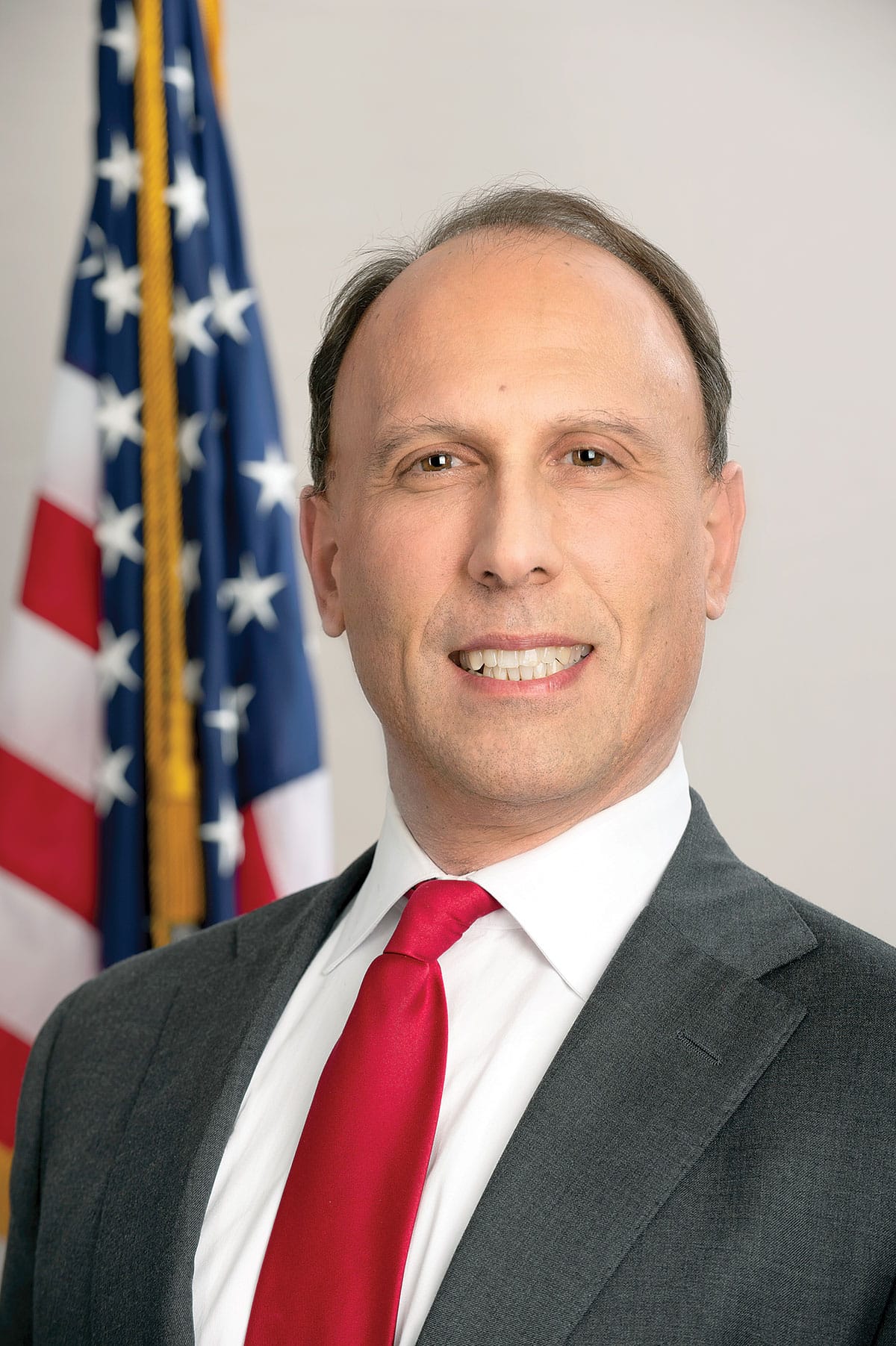
Post 1 Councilmember Phil Sadd is hosting a non-partisan town hall meeting at Winters Chapel United Methodist Church on Tuesday, October 29 at 7 p.m.
The meeting will begin with an update on activities in the City of Peachtree Corners and an overview of plans for future projects.
“The upcoming town hall will not only provide our residents with information and an opportunity to ask questions, but will also allow me to hear directly from them about their concerns and desires for the future of our city,” said Sadd.
Topics to be discussed include:
- New development/redevelopment
- Trails and parks
- Transportation improvement projects
- November 5 ballot questions
- Candidates for state and county local seats
An informative public forum
For the upcoming November 5 election, Peachtree Corners voters will have decisions to make on very important local issues. Topics on the ballot include a county-wide transit SPLOST referendum, amendments to the state constitution and the election of local state and county Officials.
“Unfortunately, there hasn’t been a public forum in Peachtree Corners during this election cycle that covers all these topics,” Sadd stated. “Every voter should have the opportunity to be informed about every item on the ballot, so they fully understand each question they need to answer and each vote they need to make.”
The Town Hall will provide information about these topics, as well as an opportunity to hear from and meet the local state (both senate and house) and county (chairman and commissioner) candidates that are on the ballot.
For more information, visit peachtreecornersga.gov.
Related
City Government
Southwest Gwinnett Mayors Share Visions for the Future
Published
3 months agoon
July 22, 2024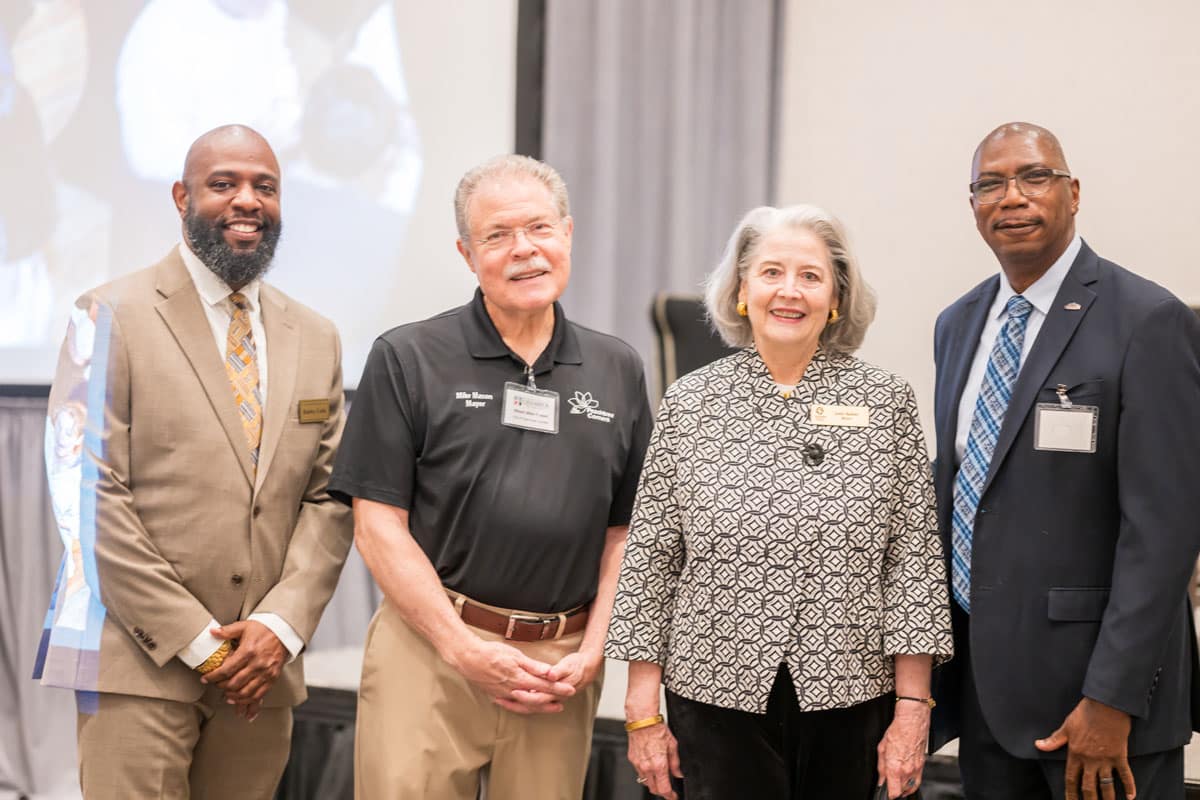
In what has now become tradition, the Southwest Gwinnett Chamber of Commerce hosted mayors from Berkeley Lake, Norcross and Peachtree Corners at a panel discussion on July 12 at the Hilton Atlanta Northeast.
The conversation centered around strategies for revitalizing and expanding metro Atlanta cities, with a focus on redevelopment, zoning ordinance reform, pedestrian and bicycle safety and investing in local schools and affordable housing initiatives.
Zoning changes
“We are beginning a really big project in our city. We have had ordinances that we’ve been working on ever since the city was incorporated in the 1950s,” said Berkeley Lake Mayor Lois Salter.
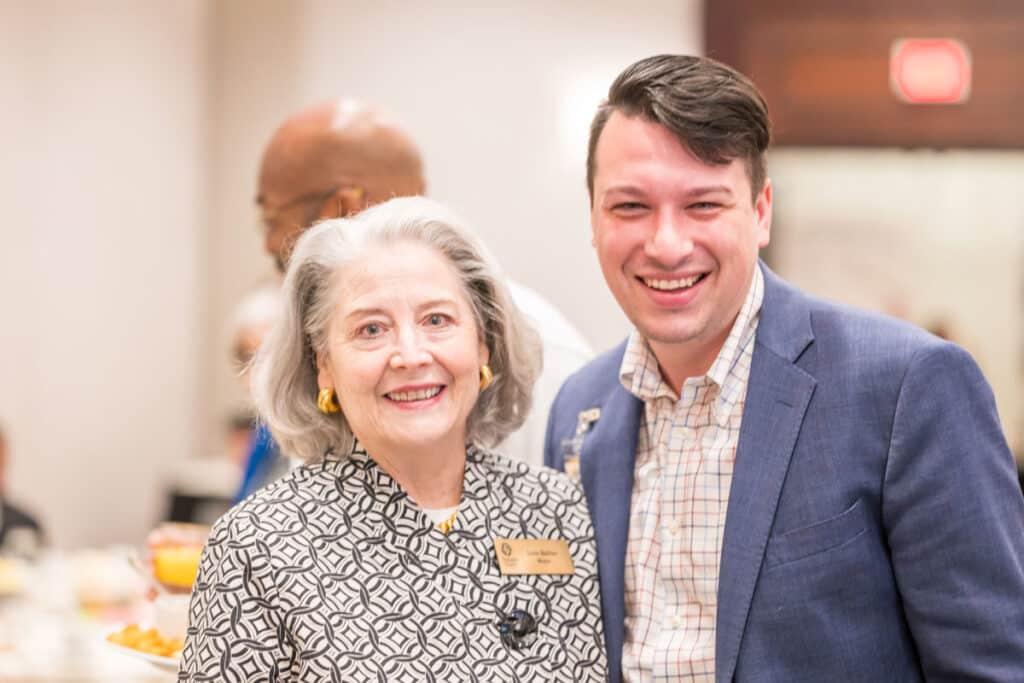
“We feel that we need to overhaul the whole zoning ordinance system and hire a consultant to come and elicit understanding and opinions from our citizens. We want them to be a part of that. We have some folks that resist any kind of regulation. They just want us to regulate their neighbors,” she added.
Norcross Mayor Craig Newton agreed that evolving needs are an important reason to change the zoning, and planning for what lies ahead is paramount. He pointed out that all Georgia cities must implement a comprehensive plan to maintain their qualified local government certifications and remain eligible for selected state funding.
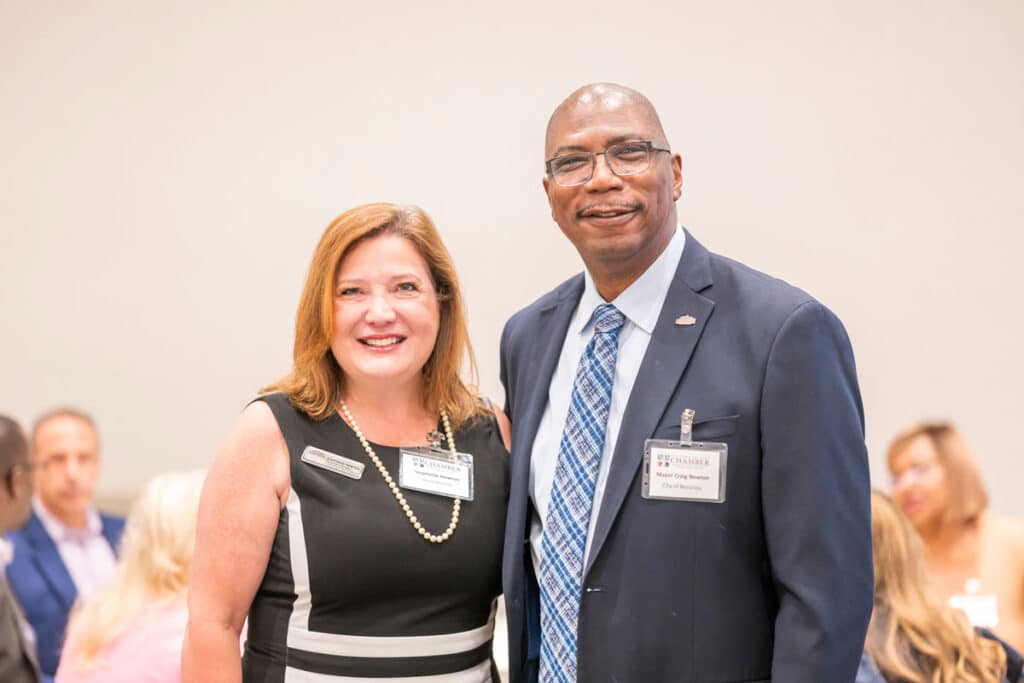
Land development
“We intend to focus on improving pedestrian bicycle safety downtown and establish a sidewalk activity improvement,” he said. “We’re also looking at approving parking in our town center and constructing the Norcross Greenway, which will bring a much-welcomed park, green space and a trail,” he added.
The county announced earlier this year that the project involves redeveloping the existing property into a park that will span almost two acres. It will offer various community spaces, including a multi-use trail, playground, covered picnic area, restroom building and a 41-space parking lot.
In addition to its amenities, a 12-foot-wide concrete trail segment will wind through the park and utility corridor, connecting Singleton Road to Dickens Road.
The trail is part of the 2018 Gwinnett Trails Countywide Trails Master Plan‘s Norcross to Lilburn Trail with an internal loop trail connecting to the neighborhood.
Commercial use
Peachtree Corners has had several “community-friendly” projects come online in the past year, but the effects of the pandemic continue to linger.
“When you think about the future, you’re thinking about the landmass and buildings and commerce. Probably the most significant issue facing a lot of us in the near term is modern office space,” said Peachtree Corners Mayor Mike Mason. “There’s a lot of space. The question is, are people going to come back?”
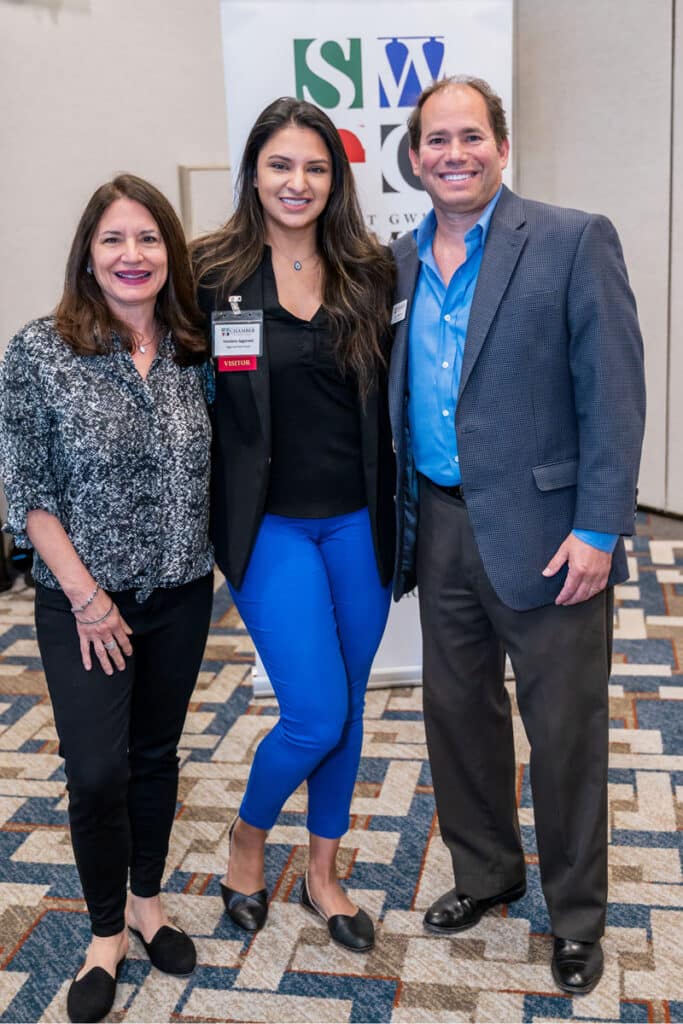
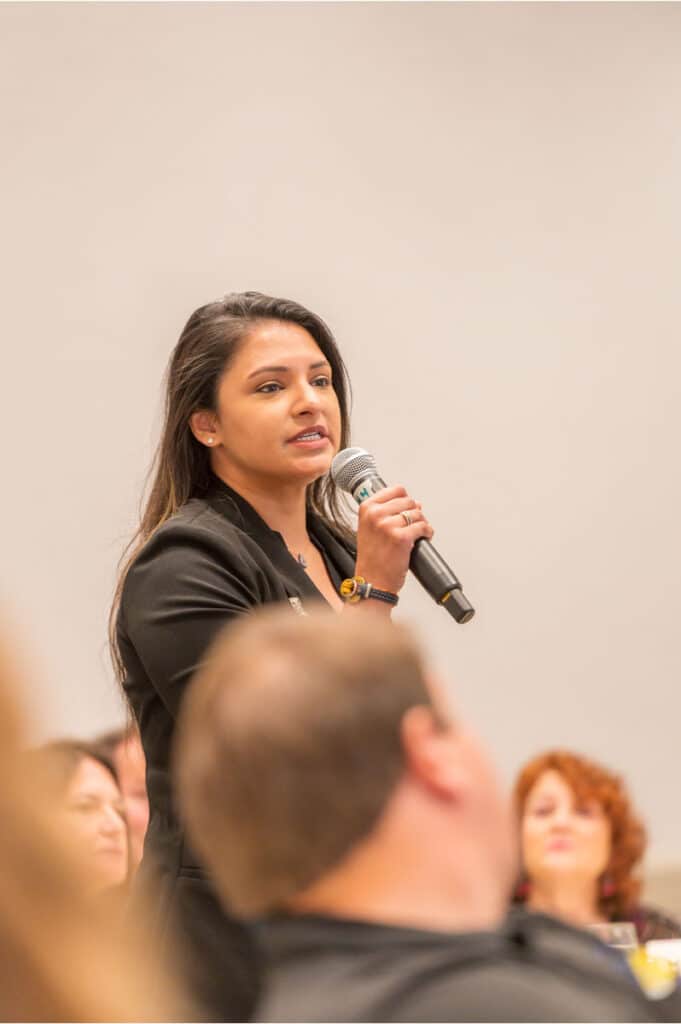
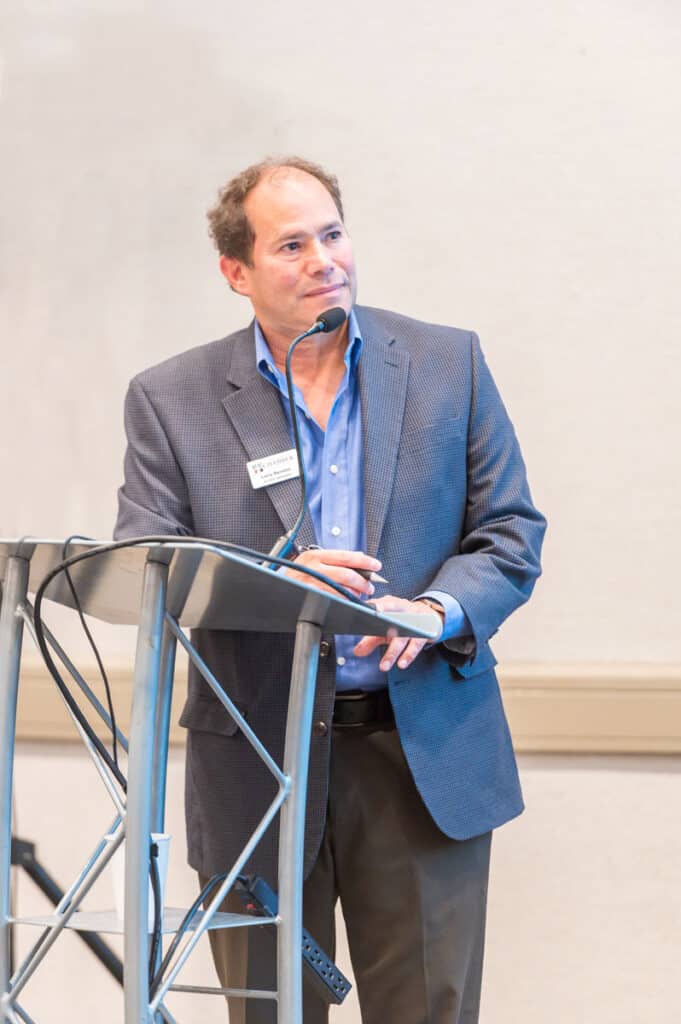
He said that the central retail area has shifted with the revitalization of The Forum and that’s making city leaders rethink city planning.
“We’re having a look at our code and things like that. But from another point of view that will drive the decision about what communities are going to look like,” he said. “For example, there are people coming into the city that say some buildings are technologically obsolete.”
Public safety
Even though Berkeley Lake is the smallest of the three cities and has the highest average home values, all the mayors agreed that public safety is a growing concern.
“Living in Norcross offers residents a dense suburban feel that’s somewhat rural compared to the city of Atlanta,” said Newton. “But some of our public safety initiatives are increasing police presence in high crime areas.”
As the only one of the three cities with a full police department, Norcross is seeking creative ways to implement effective community policing strategies to build trust and communication between law enforcement and the residents.
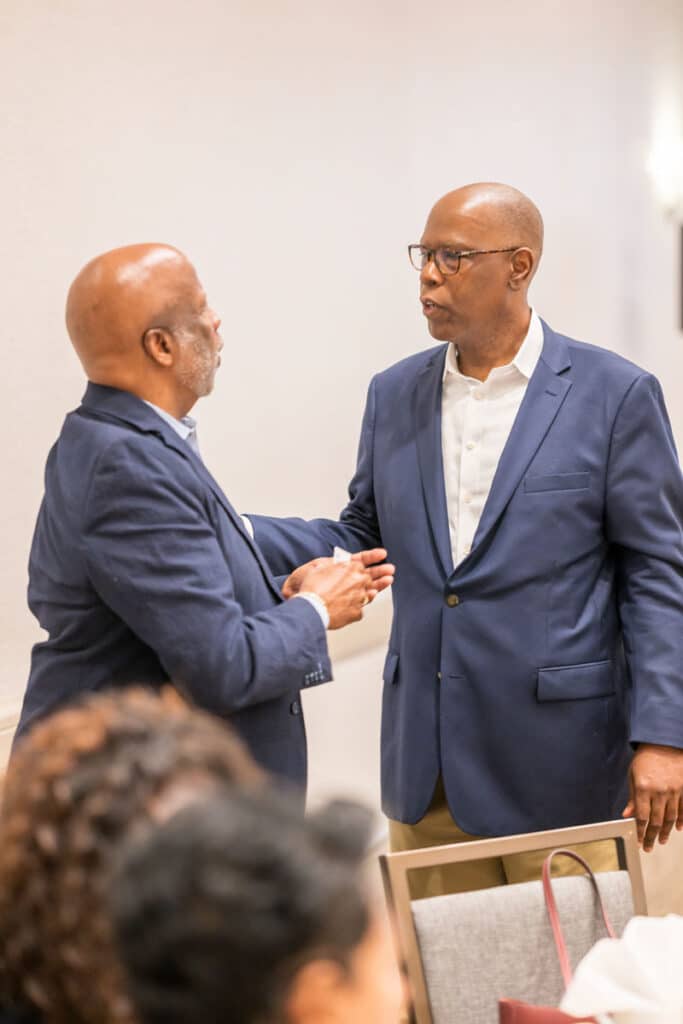
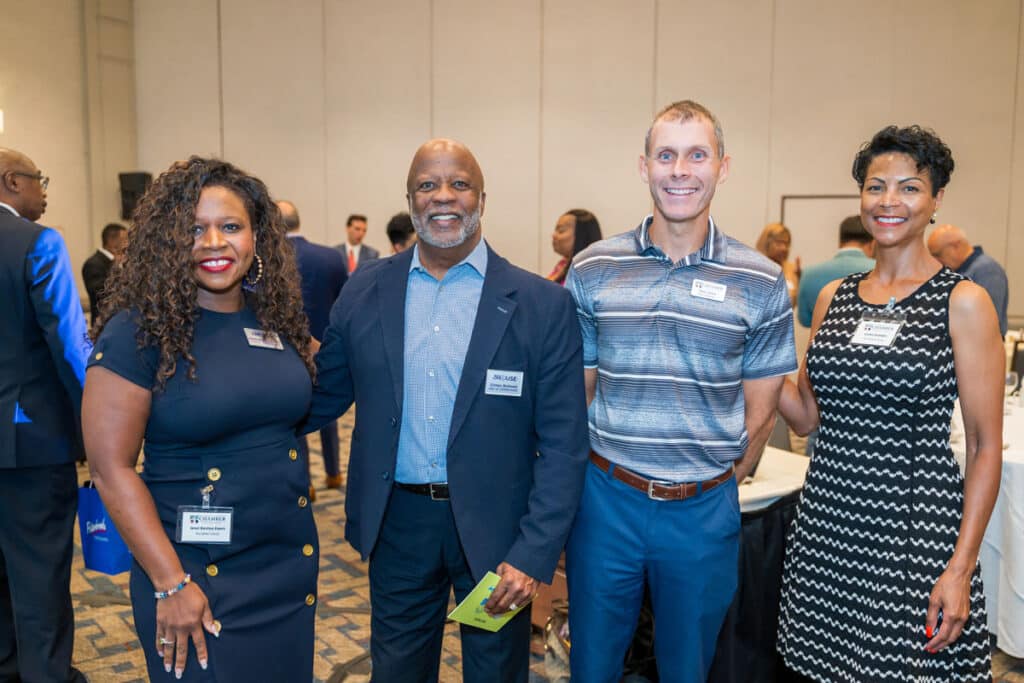
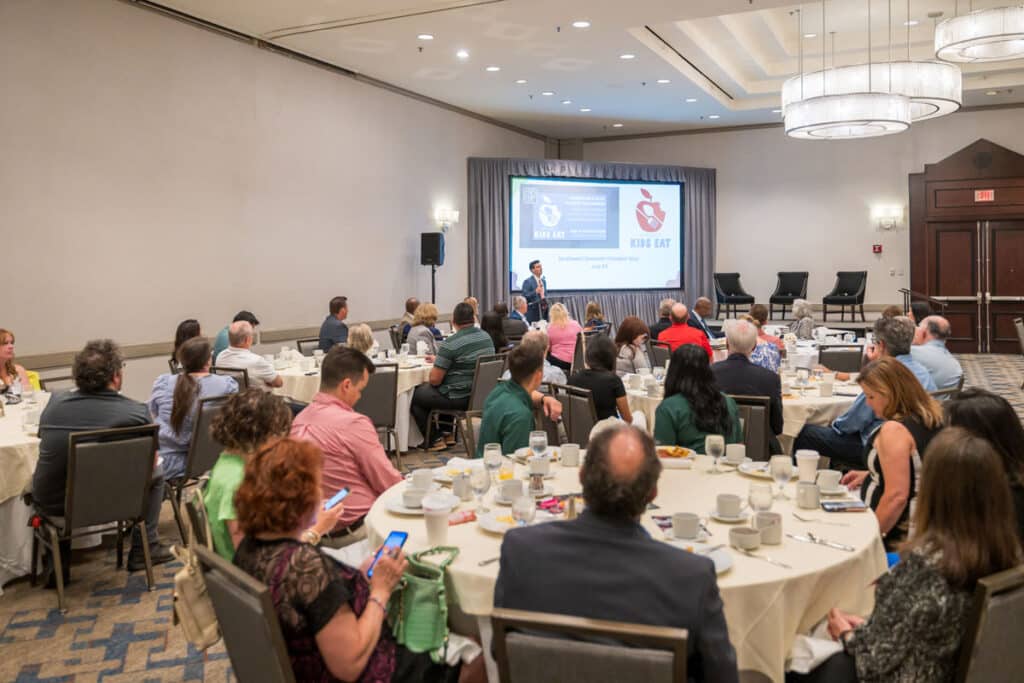
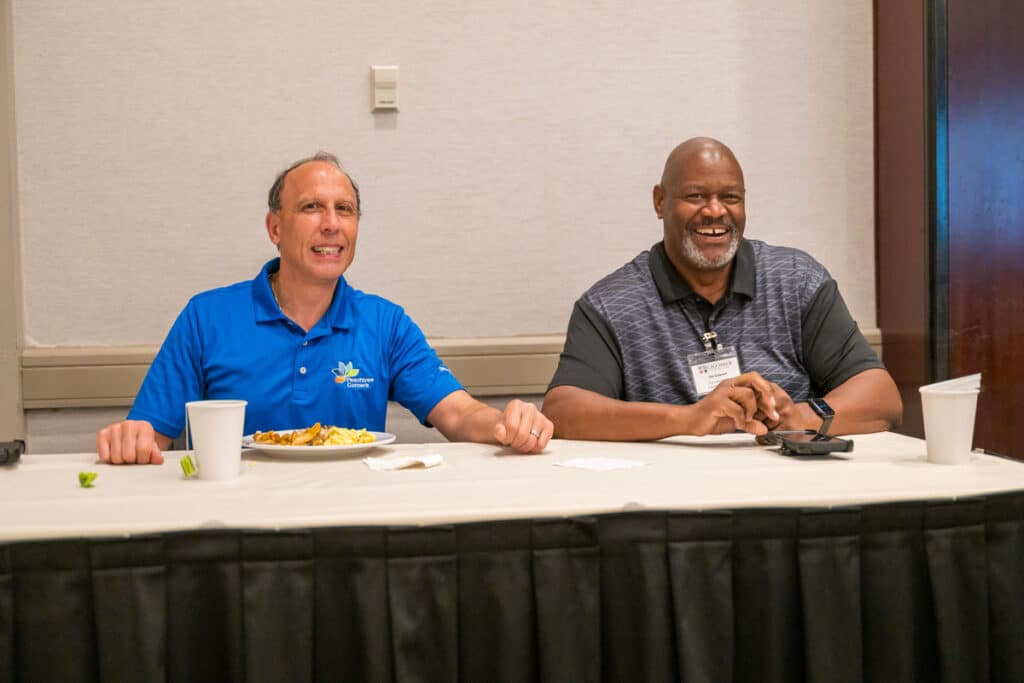
Newton mentioned programs such as Neighborhood Watch, youth outreach programs and educational initiatives along with enhancing emergency response capabilities with training for the local fire department and EMS services.
“Our response time goal is for an officer to be on-site in an emergency within 30 minutes,” he said. “But that doesn’t happen.”
Extended-stay hotels tend to attract crime, so Newton said the city has worked with owners to improve lighting in the public spaces to deter criminal activity.
“We’ve partnered with nonprofit businesses and local stakeholders to support social services employment opportunities for at-risk individuals,” he said. “By working together with various organizations and entities were able to address the complex challenge of public safety.”
Community accountability
With no police force, Berkeley Lake relies heavily on cameras and old-fashioned “knowing your neighbors,” said Salter.
“Some of our individual HOAs are buying and furnishing and paying for cameras to safeguard their neighborhoods,” she said.
Although there may be pockets of criminal behavior around the city, Salter said a police officer once described Berkeley Lake as a “black hole” of crime because there’s so little crime data.
“One of the reasons for that we feel is that historically we’ve been a very neighborly people,” she said. “There is an amazing system of community cohesiveness.”
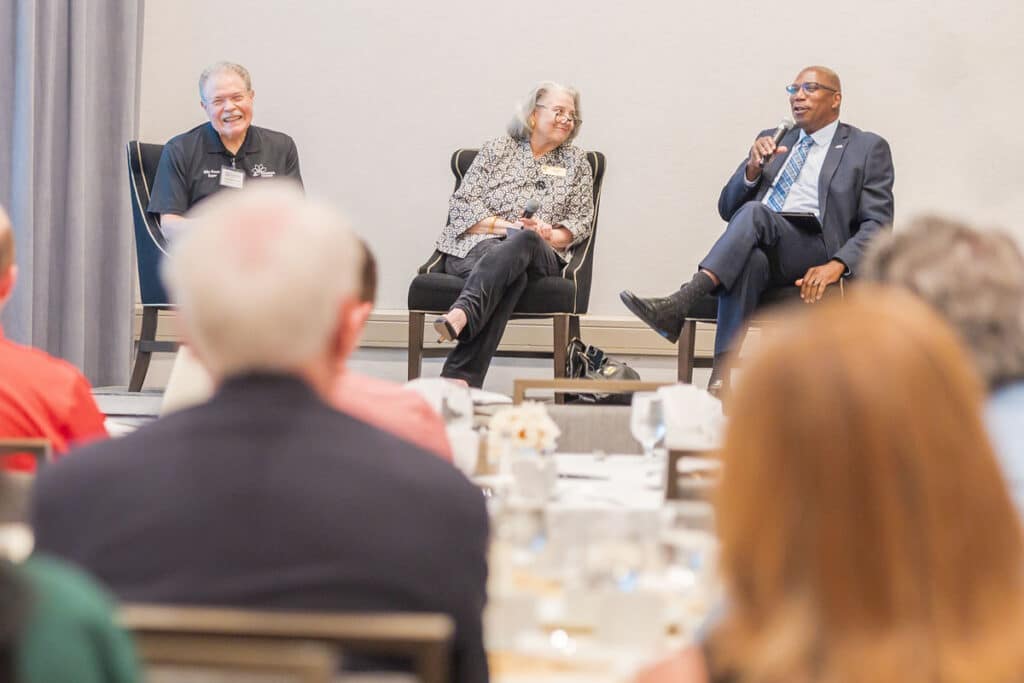
Peachtree Corners is taking its own approach.
“We’ve recently added a Marshal Service and as Lois mentioned we’re also leaning on technology,” said Mason.
The marshal department doesn’t take the place of the services provided by Gwinnett County Police, it primarily enforces city code and aids Gwinnett PD when necessary.
“We’re utilizing as much technology as we can,” said Mason.
Gwinnett PD is instructing where to locate cameras and the city keeps adding them. There have been several instances in the last year or so where coordination among agencies and the use of technology have thwarted or caught criminals.
At the end of the day, the three mayors said the cities all rely on each other. Being so close means that economic development, enhanced entertainment and other desirable amenities are boons for them all.
Related
City Government
Planning and Development is Changing in Peachtree Corners
Published
5 months agoon
June 6, 2024
From Peachtree Corners Mayor Mike Mason’s monthly column.
After the COVID-19 pandemic, the city noticed a development trend that focused on the importance of social interaction. It began seeing development applications for indoor pickleball, virtual racing, garden clubs, car clubs and other recreational uses.
When our city was established in 2012, it adopted Gwinnett County’s codes and ordinances to maintain consistency and these new social interaction-focused uses were not initially considered in the city’s current Comp Plan or zoning code.
Working from home is another market trend having a big impact on local office parks. This economic engine is driven by office parks such as Technology Park and there’s always been a priority placed on preserving office stock.
Even though the commercial office market is waning right now, that pendulum is still trying to figure out where it will settle in. Most of these new socially focused uses find the best home in an office setting.
Due to the increasing number of these applications and the evolving market trends, the city has imposed a six-month moratorium on projects in the Central Business District character area. The moratorium came into effect on May 3 and will end on November 3.
This halt will allow the city six months to pause rezoning applications, special use permits and variances applications for residential or mixed-use development. It will help the city maintain the status quo, stop new applications from coming in and allow for officials to consult with experts and delve deeper into the code and comprehensive plans.
The city plans to conduct extensive research, analysis and strategic planning during this period to help determine if any changes should be made to the comprehensive plan and zoning regulations.
For instance, it might be beneficial to designate downtown as a distinct character area separate from the central business district. Implementing new zoning regulations to transform it into an entertainment district or a unique downtown character area could be a viable option. Many cities have already adopted this type of zoning.
Office parks and businesses throughout the city provide a balance of jobs and residents that allow the city to be the second largest in the state with a zero-millage rate or no city property tax.
Therefore, as part of this process the city will research ways it can preserve, stabilize and enhance the economic engine through the activation of underutilized spaces within office parks.
This proactive approach will help maintain the job-to-resident balance that allows the zero-millage rate while positioning the city for success as the office market pendulum settles.
The most important thing this moratorium does is allow the city to consider what will work best for Peachtree Corners. Furthermore, it communicates to developers that the city requires a pause because current zoning regulations and comprehensive plan do not adequately address future goals.
Related
Read the Digital Edition
Subscribe
Keep Up With Peachtree Corners News
Join our mailing list to receive the latest news and updates from our team.
You have Successfully Subscribed!

TransPak Acquires Reid Packaging to Expand East Coast Presence

Peachtree Corners City Leaders Engage Residents on Land Use Development

The NOW Massage Opens Peachtree Corners Boutique at The Forum

GCPL Accepting Applications for Next New Start Entrepreneurship Incubator

Ruwa Romman’s Re-Election Bid: Addressing Housing, Taxes and Transportation in Gwinnett [Podcast]

Councilmember Sadd to Host Town Hall Meeting on October 29

PTC Arts Inc. Furthers Mission to Provide Accessible Art

From Corporate to Sci-Fi Author: Jill Tew Discusses ‘The Dividing Sky’ [Podcast]

From Corporate to Sci-Fi Author: Jill Tew Discusses ‘The Dividing Sky’ [Podcast]

PTC Arts Inc. Furthers Mission to Provide Accessible Art

Councilmember Sadd to Host Town Hall Meeting on October 29

Ruwa Romman’s Re-Election Bid: Addressing Housing, Taxes and Transportation in Gwinnett [Podcast]

GCPL Accepting Applications for Next New Start Entrepreneurship Incubator

TransPak Acquires Reid Packaging to Expand East Coast Presence

The NOW Massage Opens Peachtree Corners Boutique at The Forum

Peachtree Corners City Leaders Engage Residents on Land Use Development

Light up the Corners [Video]

Capitalist Sage: Business Leadership in Your Community [Podcast]

Cliff Bramble: A Culinary Adventure through Italy

Top 10 Brunch Places in Gwinnett County

A Hunger for Hospitality

THE CORNERS EPISODE 3 – BLAXICAN PART 1

Top 10 Indoor Things To Do This Winter

The ED Hour: What it takes to Remove Barriers from Education

Peachtree Corners Life
Topics and Categories
Trending
-
Business1 week ago
TransPak Acquires Reid Packaging to Expand East Coast Presence
-
Health & Wellness1 week ago
The NOW Massage Opens Peachtree Corners Boutique at The Forum
-
Community5 days ago
GCPL Accepting Applications for Next New Start Entrepreneurship Incubator
-
Peachtree Corners Life4 days ago
Ruwa Romman’s Re-Election Bid: Addressing Housing, Taxes and Transportation in Gwinnett [Podcast]





